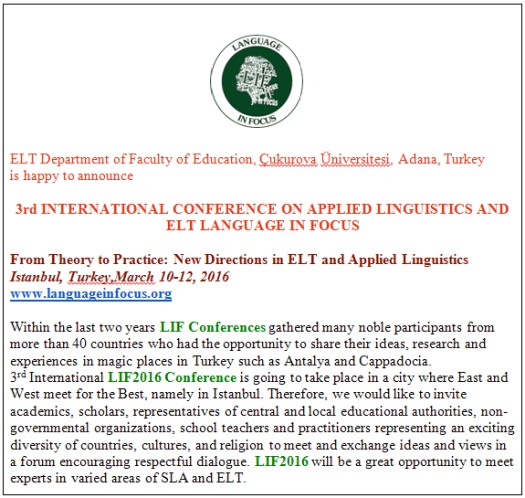Dear HLT Readers,
Welcome to the October issue of HLT. We have had a busy Pilgrims summer in Canterbury, and a fantastic and stimulating Humanising Language Teaching Conference in Portonovo, Italy. Now we are making plans for the future. In Pilgrims News: Pilgrims is a Family and We Want it to Grow... you can read about our plans to organise teacher training events between now and February so teachers get to experience what Pilgrims feels like, and so they can then apply for EU funding by the March 2016 deadline. What we need your help to organise a venue for the event, and to invite teachers from their region to attend the events. If you'd like to help us create amazing experiences for teachers in your country, please contact Jim Wright (jim@pilgrims.co.uk)
In this issue in Corpora ideas section Michael Rundell is saying goodbye on our behalf to Adam Kilgarriff. Adam’s contributions to using the language corpus cannot be underestimated and he will be greatly missed.
|

Challenging Reading: English-Language Education with
Children and Teenagers
The TEFL team at the University of Münster is organising an international
conference on reading as a deeply mindful activity and powerful mechanism for
learning in EFL/ESL education – from the youngest learners to advanced
secondary students. The area covered includes the pleasure of language play
and creativity, the multi-literacy challenge of multimodal literature, the
danger of the stereotyped single story and the cognitive challenge of
exploring alternative worlds. Recent research on language education will
combine with intercultural learning, emotional engagement, the potential for
changing perspective and empathy building, critical literacy and cognitive
criticism in the field of children’s, young adult and adult literature.
STRANDS
- THE CHALLENGE OF LANGUAGE PLAY AND LANGUAGE CREATIVITY
- THE MULTI-LITERACY CHALLENGE OF MULTIMODAL LITERATURE
- THE CRITICAL CHALLENGE OF AVOIDING THE SINGLE STORY
- THE COGNITIVE CHALLENGE OF EXPLORING ALTERNATIVE WORLDS
CONFERENCE WEBSITE
www.uni-muenster.de/Anglistik/Research/Tefl/challengingreading/index.html
--
Dr Janice Bland, Deputy Chair of TEFL, University of Muenster
CHALLENGING READING INTERNATIONAL CONFERENCE
Now in paperback: Bland, J. (2013) Children's Literature and Learner
Empowerment. Bloomsbury.
CLELEjournal - www.clelejournal.org
|
Major articles in this issue offer insights into teaching English in China: An Evaluation of EFL Students’ Vocabulary Size and Their Textbooks: A Case Study of Vocational College Students in China by Feng Teng, in Korea: Scared to Speak: Underlying Elucidations that cause Communicative Anxiety among South Korean Tertiary EFL Students by Michael T. R. Madill, and in Iran: It Is Time to Make a Distinction between Engagement and Involvement by Hamidreza Moeiniasl, and Language Input in EFL Classroom by Mostafa Younesi.
Those interested in teaching very young learners or young learners will probably start reading this issue with one of these contributions: Children's Creativity Using Poetry by Malu Sciamarelli, Broadening Children's Reading Scholarship through Fairy Tales: Authenticity in EFL Reading by Mohammad Khatib and Ghasem Aghajanzadeh, Making Early Language Learning Effective by Mija Selič, or kids jokes in the Jokes section - Kids Joy: Butt Dust, found on the Internet.
There are a number of articles on motivating the learners through teaching methods and ways of correcting and giving feedback: The Effects of Teaching Critical Thinking on EFL Learners’ Listening Comprehension by Mansor Fahim and Sadegh Shariati, ‘Teaching Subjects in English’ as an Effective Method to Familiarize Unmotivated University Students with Practical Use of English by Shigetoshi Mori, On Feedback and Error Correction by Consuela Popa, and Using an Editing Software in Teaching Languages Humanistically by Shibu Simon. Those interested in other uses of IT, beyond ways of error correction, will surely look at Using Technology in the Classroom by Vasiliki Mavrothalassiti, and Using IT in Language Classes by Hanna Kryszewska, which presents pre-service teachers’ opinions on using IT in EFL classes.
As usual, there are many practical classroom ideas in Lessons with Music by Sandra Vida, Folk Tales as a Source of Abundance by Joanna Czeredys, Lessonstream by Jamie Keddie, and Making predictions: A Fluency, Grammar and Vocabulary Exercise by David Beauchamp.

If you want to find out about interesting publications go to Writing From The Heart While Learning English: Why New Speakers of English Are So Enthusiastic About It by Lisa Lieberman Doctor, What Should I Read Next? Social by Mathew Lieberman by Nick Michelioudakis, Short Book Reviews by Hanna Kryszewska, and New Books from Routledge.
Enjoy the October issue of HLT and if you think you could contribute an article to HLT, please do get in touch with me.

Hania Kryszewska
HLT Editor
E-mail: hania.kryszewska@pilgrims.co.uk



|